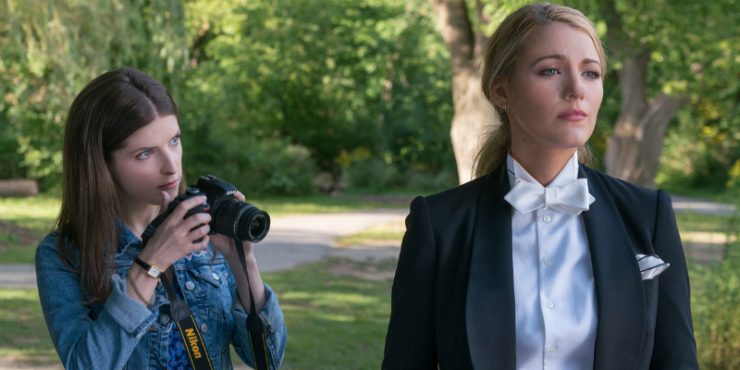The twisting plot of A Simple Favor is meant, I presume, to remind audiences of film noir. The severity of the characters and the fates that they meet certainly meet the criteria. But of course, this film is a comedy by Paul Feig, a male director who has seemingly mastered female-led comedies, so much so that he feels brash enough to make something which deconstructs the formula. To be clear, A Simple Favor is deconstructing previous woman-centered comedies more often than it’s deconstructing noir, but that it is able to use the calling cards of pulp mysteries throughout its story makes it that much more interesting. The film is based on a suspense novel by Darcey Bell which, based on appearances, seems about as straight-forward a piece of commercial fiction one could find. So how does Feig go about making this film out of that?
The answer seems to be his two stars: Anna Kendrick and Blake Lively, two talented actresses who don’t lack for work and yet wouldn’t be most people’s first choice for something of this ilk: a film that is wickedly deceitful, filled with unreliable perspectives and devilish secrets. Kendrick plays Stephanie, a mommy vlogger and widow whose enthusiasm for parenting and crafts makes her the butt of jokes for a lot of the other parents at school. Lively plays Emily, a fierce, stylish PR executive with a proper potty mouth and a taste for hard martinis. Emily and Stephanie’s sons become friends at school, which leads to playdates at Emily’s chic, extravagant home. Stephanie is in awe of Emily’s lavish lifestyle and Emily comes to enjoy Stephanie’s quaint awkwardness (her constant apologizing, self-censoring). The two become unlikely friends.
When Emily asks Stephanie to pick up their sons from school so she can finish work one afternoon, it seems like a normal request, but then Emily never comes to pick up her son. Stephanie talks to Emily’s husband, Sean (Henry Golding), who has as little information on Emily’s whereabouts as she does, and the search begins. When Stephanie begins talking about Emily’s disappearance on her vlog, her subscriptions suddenly go up, and it’s not the only aspect of her life that changes. Helping Sean cope without Emily, Stephanie finds herself suddenly usurping her lost friend’s place, quickly playing the part of wife and mother in a new, fancier home. As the line blurs between Emily’s life and her own, Stephanie becomes more and more obsessed with Emily’s life and past. The more she learns, the more it confirms how little she actually knew about her supposed best friend.
A Simple Favor‘s plot spins quickly into absurdity, and admissions of murder, theft and sex are all revealed. Our considerations of each character changes by the minute. The ridiculousness is a calling guard of post-Gone Girl suspense fiction, but A Simple Favor is the only film adaptation – other than Gone Girl itself – that understands that comedy is the best way to translate these kinds of stories to the big screen. Feig’s film isn’t as darkly cynical as David Fincher’s Gone Girl film, nor does it seep its complete distrust in humanity in its characters in Girl, but both movies have a field day with the silliness of their good-girls-gone-bad premises. (A lack of this understanding is probably what ultimately led to the disastrous film adaptation of Girl on the Train.) What Favor lacks in slick nihilism, it makes up for in stylish charisma and its unwillingness to drop appearances.
Favor‘s screenplay (by Jessica Sharzer) is incredibly clever, but its Feig’s looseness with his actors, particularly his willingness to let Kendrick and Lively pursue laughs in unexpected places, that makes the movie work. It’s probably a credit to Kendrick’s talent that she always seems impeccably cast, but Feig asks more than usual from her here. Playing against Kendrick’s prude, straight-laced persona (and fully leaning into her incredible comedic delivery), we get a role that seems perfectly suited to the former Broadway star, yet reveals shades of her talent we hadn’t seen before. On the other end, Lively’s version of the femme fatale, decked out in breathtaking pantsuits and flowing Farrah Fawcett hair, is the movie’s crowned jewel. Her mercurial Emily is funny, disturbing and always keeping the audience at an arm’s length, looking for more. It’s a comedic performance with a high degree of difficulty, easy to lapse into parody, but Lively plays it perfectly, giving Favor a much-needed edge.
Like a lot of contemporary noirs, A Simple Favor‘s third act has to spend too much time explaining its twists, and seems to lose interest in the things that make it so fascinating – specifically its preoccupation with obsession, desire, sexuality and how these things play into female relationships. Spiritually, Favor is a lot closer to Stanley Donen’s frivolous romantic mystery Charade than the classic noirs like Double Indemnity or The Big Sleep, and like Charade it keeps a strong balance between its elements of danger and its consistent comic beats. This is no small thing: spoofing a mystery while containing a mystery worth keeping tabs on, but Feig pulls it off. And while there are moments where you can question the integrity of its plot structure, I have a feeling that A Simple Favor will be a film that stays in my mind long after I’ve seen it. The precision of its performances, the expertise of its costuming, the misleading nature of its comedy, makes it one of the most unique Hollywood films of the year.
Directed by Paul Feig










